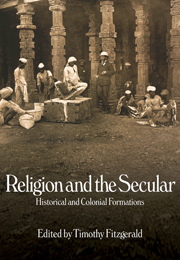Book contents
- Frontmatter
- Dedication
- Contents
- Acknowledgements
- Contributors
- Introduction
- 1 Dialectics of conversion: Las Casas and Maya colonial Congregación
- 2 A higher ground: the secular knowledge of objects of religious devotion
- 3 Secularizing the land: the impact of the Alaskan Native Claims Settlement Act on indigenous understandings of land
- 4 The formative process of State Shinto in relation to the Westernization of Japan: the concept of ‘religion’ and ‘Shinto’
- 5 Religious and secular in the Vietnam War: the emergence of highland ethno-nationalism
- 6 Colonialism all the way down? Religion and the secular in early modern writing on south India
- 7 Understanding politics through performance in colonial and postcolonial India
- 8 Real and imagined: imperial inventions of religion in colonial southern Africa
- 9 Religion in modern Islamic thought and practice
- 10 Rudolf Otto, cultural colonialism and the ‘discovery’ of the holy
- 11 Encompassing Religion, privatized religions and the invention of modern politics
- 12 Colonialism and the myth of religious violence
- Index
11 - Encompassing Religion, privatized religions and the invention of modern politics
- Frontmatter
- Dedication
- Contents
- Acknowledgements
- Contributors
- Introduction
- 1 Dialectics of conversion: Las Casas and Maya colonial Congregación
- 2 A higher ground: the secular knowledge of objects of religious devotion
- 3 Secularizing the land: the impact of the Alaskan Native Claims Settlement Act on indigenous understandings of land
- 4 The formative process of State Shinto in relation to the Westernization of Japan: the concept of ‘religion’ and ‘Shinto’
- 5 Religious and secular in the Vietnam War: the emergence of highland ethno-nationalism
- 6 Colonialism all the way down? Religion and the secular in early modern writing on south India
- 7 Understanding politics through performance in colonial and postcolonial India
- 8 Real and imagined: imperial inventions of religion in colonial southern Africa
- 9 Religion in modern Islamic thought and practice
- 10 Rudolf Otto, cultural colonialism and the ‘discovery’ of the holy
- 11 Encompassing Religion, privatized religions and the invention of modern politics
- 12 Colonialism and the myth of religious violence
- Index
Summary
No tribe has a word for ‘religion’ as a separate sphere of existence. Religion permeates the whole of life, including economic activities, arts, crafts and ways of living. This is particularly true of nature, with which native Americans have traditionally a close and sacred relationship. Animals, birds, natural phenomena, even the land itself, have religious significance to native Americans: all are involved in a web of reciprocal relationships, which are sustained through behaviour and ritual in a state of harmony. Distinctions between natural and supernatural are often difficult to make when assessing native American concepts.
(Cooper 1988: 873-4)… Religion and Policy, or Christianity and Magistracy, are two distinct things, have two different ends, and may be fully prosecuted without respect one to the other; the one is for purifying, and cleaning the soul, and fitting it for a future state; the other is for Maintenance and Preserving of Civil Society, in order to the outward conveniency and accommodation of men in this World. A Magistrate is a true and real Magistrate, though not a Christian; as well as a man is a true and real Christian, without being a Magistrate.
(Penn 1680: 4)The two quotations above give us the outlines of two profoundly different meanings given to ‘religion’. The first talks about religion as permeating the whole of life, and it bears comparison with religion in early modern England.
- Type
- Chapter
- Information
- Religion and the SecularHistorical and Colonial Formations, pp. 211 - 240Publisher: Acumen PublishingPrint publication year: 2007



